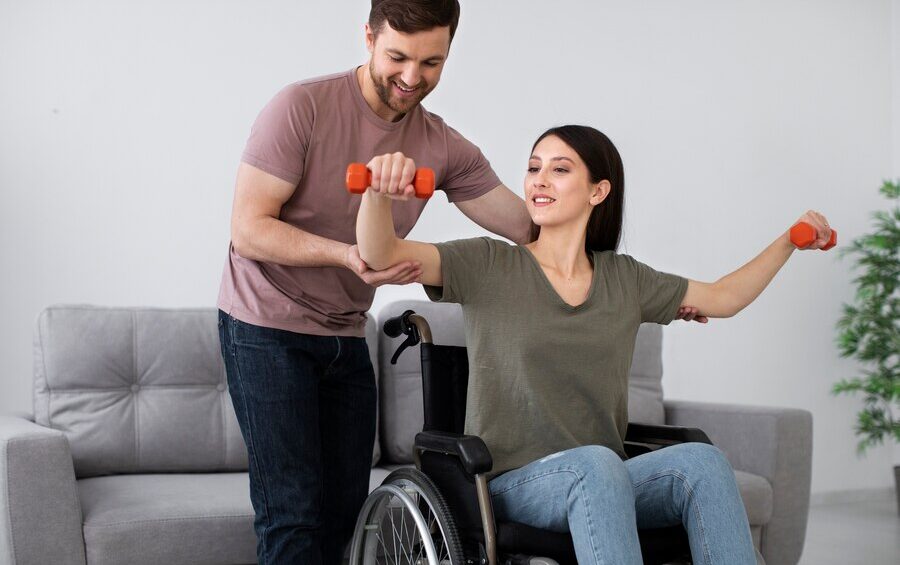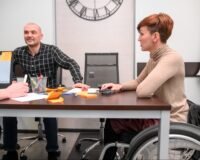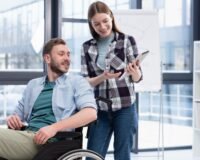Introduction
Physical disabilities can affect an individual’s mobility, coordination, strength, or endurance, significantly impacting their daily life and independence. These conditions can be congenital or acquired due to injury, illness, or degenerative diseases. By understanding different types of physical disabilities and their challenges, we can work towards a more inclusive society that provides the right support for every individual.
At Careable, we are committed to helping individuals with physical disabilities lead fulfilling lives through NDIS-funded services. We offer personalized support in daily living, therapy coordination, assistive technology, community participation, and Supported Independent Living (SIL). Whether it’s helping with mobility, therapy, or home modifications, our focus is on empowering people with disabilities to achieve their goals.
Mobility Impairments
Conditions affecting movement, strength, or coordination, such as paralysis, muscular dystrophy, and limb loss.
Support Strategies:
- Provide mobility aids such as wheelchairs, walkers, or prosthetic limbs.
• Offer occupational and physical therapy to enhance independence.
• Modify homes and workplaces for better accessibility.
• Support participation in adaptive sports and community activities.
Acquired Brain Injury (ABI)
Damage to the brain due to trauma, stroke, or illness, leading to cognitive and physical impairments.
Support Strategies:
- Provide mobility aids such as wheelchairs, walkers, or prosthetic limbs.
• Offer occupational and physical therapy to enhance independence.
• Modify homes and workplaces for better accessibility.
• Support participation in adaptive sports and community activities.
https://careable.com.au/blog/acquired-brain-injury-abi
Spinal Cord Injury
Injury to the spinal cord resulting in paralysis or loss of function below the injury site.
Support Strategies:
- Provide mobility aids such as wheelchairs, walkers, or prosthetic limbs.
• Offer occupational and physical therapy to enhance independence.
• Modify homes and workplaces for better accessibility.
• Support participation in adaptive sports and community activities.
: https://careable.com.au/blog/spinal-cord-injury-support
Cerebral Palsy
A group of movement disorders affecting muscle tone, balance, and posture, typically caused by brain damage before or at birth.
Support Strategies:
- Provide mobility aids such as wheelchairs, walkers, or prosthetic limbs.
• Offer occupational and physical therapy to enhance independence.
• Modify homes and workplaces for better accessibility.
• Support participation in adaptive sports and community activities.
https://careable.com.au/blog/cerebral-palsy-support
Muscular Dystrophy
A genetic condition that causes progressive muscle weakness and degeneration.
Support Strategies:
- Provide mobility aids such as wheelchairs, walkers, or prosthetic limbs.
• Offer occupational and physical therapy to enhance independence.
• Modify homes and workplaces for better accessibility.
• Support participation in adaptive sports and community activities.
: https://careable.com.au/blog/muscular-dystrophy-support
Multiple Sclerosis (MS)
An autoimmune disease that damages the central nervous system, leading to mobility and coordination challenges.
Support Strategies:
- Provide mobility aids such as wheelchairs, walkers, or prosthetic limbs.
• Offer occupational and physical therapy to enhance independence.
• Modify homes and workplaces for better accessibility.
• Support participation in adaptive sports and community activities.
https://careable.com.au/blog/multiple-sclerosis-support
Epilepsy
A neurological condition causing recurring seizures, which can impact daily activities and safety.
Support Strategies:
- Provide mobility aids such as wheelchairs, walkers, or prosthetic limbs.
• Offer occupational and physical therapy to enhance independence.
• Modify homes and workplaces for better accessibility.
• Support participation in adaptive sports and community activities.
https://careable.com.au/blog/epilepsy-support
Tourette Syndrome
A neurological disorder characterized by involuntary tics, movements, or vocalizations.
Support Strategies:
- Provide mobility aids such as wheelchairs, walkers, or prosthetic limbs.
• Offer occupational and physical therapy to enhance independence.
• Modify homes and workplaces for better accessibility.
• Support participation in adaptive sports and community activities.
https://careable.com.au/blog/tourette-syndrome-support
Cystic Fibrosis
A genetic condition affecting the lungs and digestive system, leading to respiratory and nutritional challenges.
Support Strategies:
- Provide mobility aids such as wheelchairs, walkers, or prosthetic limbs.
• Offer occupational and physical therapy to enhance independence.
• Modify homes and workplaces for better accessibility.
• Support participation in adaptive sports and community activities.
https://careable.com.au/blog/cystic-fibrosis-support
Spina Bifida
A congenital condition where the spinal column does not close properly, affecting mobility and organ function.
Support Strategies:
- Provide mobility aids such as wheelchairs, walkers, or prosthetic limbs.
• Offer occupational and physical therapy to enhance independence.
• Modify homes and workplaces for better accessibility.
• Support participation in adaptive sports and community activities.
https://careable.com.au/blog/spina-bifida-support
Amputations and Limb Differences
The loss of a limb due to trauma, illness, or congenital conditions, requiring prosthetics and adaptive support.
Support Strategies:
- Provide mobility aids such as wheelchairs, walkers, or prosthetic limbs.
• Offer occupational and physical therapy to enhance independence.
• Modify homes and workplaces for better accessibility.
• Support participation in adaptive sports and community activities.
https://careable.com.au/blog/amputations-limb-differences-support
Musculoskeletal Conditions
Chronic conditions like arthritis, osteoporosis, and fibromyalgia that impact movement and joint function.
Support Strategies:
- Provide mobility aids such as wheelchairs, walkers, or prosthetic limbs.
• Offer occupational and physical therapy to enhance independence.
• Modify homes and workplaces for better accessibility.
• Support participation in adaptive sports and community activities.
https://careable.com.au/blog/musculoskeletal-conditions-support
How Careable Supports Individuals with Physical Disabilities
At Careable, we believe in empowering individuals with physical disabilities by providing comprehensive NDIS-funded services tailored to their unique needs. Our team works closely with participants and their families to ensure they receive the best care, therapy, and assistive solutions.
✅ Assistance with Daily Living (ADL)
✅ Supported Independent Living (SIL)
✅ Assistive Technology Support
Conclusion
Understanding physical disabilities and their challenges is crucial for creating a more inclusive society. With the right NDIS-funded support, individuals with disabilities can thrive and achieve their goals. At Careable, we are dedicated to providing personalized services that enhance independence, mobility, and quality of life.
📞 Contact Us
If you or a loved one needs NDIS-funded support for physical disabilities, reach out to our team today.
📞 Call us: 1300 DECIDE
📩 Email us: cx@careable.com.au
🌐 Visit us: [www.careable.com.au]
FAQs
What is the most common type of physical disability?
Mobility impairments, such as paralysis and muscular disorders, are among the most common physical disabilities.
How does NDIS help individuals with physical disabilities?
NDIS provides funding for assistive technology, therapy, home modifications, and daily living support.
Can people with physical disabilities participate in sports?
Yes! Many adaptive sports, such as wheelchair basketball and para-swimming, encourage physical activity and social engagement.
What assistive technology is available for physical disabilities?
Assistive technology includes wheelchairs, prosthetics, voice-to-text software, and home automation tools.
How can I apply for NDIS support?
You can apply through the NDIS website or contact Careable for assistance in navigating the process.






